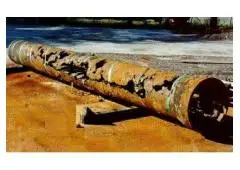Corrosion Inhibitors manufacturer and exporter
Description
Corrosion inhibitors are substances added to fluids or applied to surfaces to mitigate or prevent the corrosion of metals. They work by interfering with the corrosion process, either by forming a protective barrier on the metal surface or by altering the electrochemical reactions that lead to corrosion. Here's an overview of corrosion inhibitors:
1. Mechanisms of Action:
- Passivation: Corrosion inhibitors form a protective layer on the metal surface, preventing direct contact with corrosive agents such as oxygen and water.
- Adsorption: Inhibitors may adsorb onto the metal surface, blocking active sites where corrosion reactions occur.
- Complex Formation: Some inhibitors chemically react with metal ions or corrosion products to form stable complexes, reducing the rate of corrosion.
2. Types of Corrosion Inhibitors:
- Organic Inhibitors: Organic compounds such as amines, organic acids, and organic salts are commonly used as corrosion inhibitors.
- Inorganic Inhibitors: Inorganic compounds like chromates, phosphates, and silicates also exhibit corrosion-inhibiting properties.
- Mixed Inhibitors: These formulations combine organic and inorganic inhibitors for synergistic corrosion protection.
3. Application Areas:
- Industrial Processes: Corrosion inhibitors are used in various industries, including oil and gas production, chemical processing, power generation, and water treatment.
- Metalworking Fluids: In metalworking operations, corrosion inhibitors are added to cutting fluids, machining coolants, and grinding fluids to protect metal surfaces during machining processes.
- Surface Treatments: Corrosion inhibitors can be applied as coatings or treatments to metal surfaces to provide long-term protection against corrosion.
4. Benefits:
- Corrosion Prevention: The primary benefit of corrosion inhibitors is to prevent or significantly reduce the rate of corrosion, extending the lifespan of metal equipment and structures.
- Cost Savings: By minimizing corrosion-related damage and the need for frequent maintenance or replacement of metal components, corrosion inhibitors can lead to cost savings for industries.
- Improved Safety: Corrosion inhibition helps maintain the structural integrity of equipment and infrastructure, reducing the risk of accidents or failures caused by corrosion-induced damage.
5. Considerations:
- Compatibility: Corrosion inhibitors should be compatible with the fluid or system in which they are used to ensure effective performance without adverse effects.
- Environmental Impact: Some corrosion inhibitors, particularly those containing heavy metals or toxic compounds, may have environmental and health considerations. Environmentally friendly inhibitors are increasingly preferred.
- Effectiveness: The effectiveness of corrosion inhibitors may vary depending on factors such as temperature, pH, concentration, and the specific corrosive environment.
6. Monitoring and Maintenance:
- Regular monitoring of corrosion inhibitor concentration, corrosion rates, and the condition of protected surfaces is essential to ensure continued corrosion protection.
- Maintenance practices such as replenishing inhibitor levels, cleaning surfaces, and repairing damaged coatings should be conducted as necessary to maintain effective corrosion protection.
In summary, corrosion inhibitors play a crucial role in preventing corrosion and preserving the integrity of metal equipment and structures in various industries. Understanding the mechanisms, types, applications, benefits, and considerations of corrosion inhibitors is essential for selecting and implementing effective corrosion control strategies.






Useful information
- Avoid scams by acting locally or paying with PayPal
- Never pay with Western Union, Moneygram or other anonymous payment services
- Don't buy or sell outside of your country. Don't accept cashier cheques from outside your country
- This site is never involved in any transaction, and does not handle payments, shipping, guarantee transactions, provide escrow services, or offer "buyer protection" or "seller certification"







